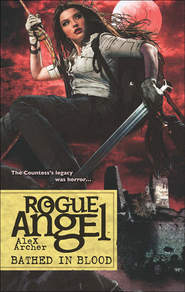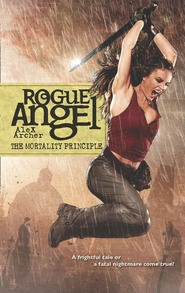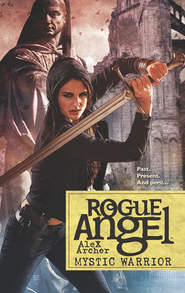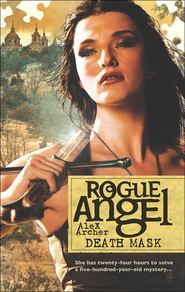По всем вопросам обращайтесь на: info@litportal.ru
(©) 2003-2024.
✖
Tear Of The Gods
Автор
Год написания книги
2019
Настройки чтения
Размер шрифта
Высота строк
Поля
By the time dusk fell over the campsite, Annja felt like she’d been working with the team for weeks.
“Not a bad first day, huh?” Craig asked her as they helped the others cover the site with tarps to protect it in case of rain later that evening.
“It was wonderful, Craig. Truly,” she said with a smile. “Thanks for inviting me.”
He grinned. “Don’t thank me yet. You haven’t tasted what passes for cooking around here.”
Once they were finished at the dig site, Annja was introduced to Sheila James, a fellow American, who gave her a tour of the camp, showed her the tent she’d be using for the duration and introduced her to some more of the students over dinner that night.
Worn out from the hard work and the lingering effects of the jet lag, she thanked them all for their hospitality and headed off to bed.
Annja found herself walking in the woods beneath the silvery light of a full moon, though she knew she was not herself. The hand at the end of her arm was decidedly male. She was part of a group of four warriors carrying the body of a fifth on a funeral bier made of wood, fashioned together with rope and vines. Around her came a host of others, warriors mainly, but some women were scattered amid the company here and there, as well—all of them moving through the trees in a long, snaking procession. Torches threw flickering light across the scene, highlighting the faces of those around her, revealing the geometric designs painted on their faces in blue woad—whirls and spirals and circles that interlinked and crossed one another so that it was difficult to discern where one ended and the next began.
The body on the bier was that of a tall warrior with long red hair. He was dressed as he’d been when he’d fallen on the battlefield, his tunic and mail stained with blood, both his own and that of his enemies. His arms were folded across his chest, his hands grasping the hilt of the sword that he’d carried into battle, the blade broken off halfway down its length.
Annja’s eyes were drawn to the necklace of gleaming black the dead man wore around his neck. It was made from a substance that she couldn’t identify, at least not from this distance, and it reacted to the light the same way an oil spill does, reflecting myriad colors back at the viewer. She felt the need to reach out and touch it….
The moonlight suddenly grew brighter, breaking her reverie, and she looked up as the group emerged from the trees into the open. They stood upon the crest of a hill that sloped gently downward until it met the edge of a wide marshland. A spit of land jutted out into the bog for a short distance and a white robed druid stood upon it, waiting for them. Behind him a massive oak tree rose out of the depths of the bog, its branches spread wide, forming a living canopy over that part of the swamp.
The procession descended the hill. When they reached the narrow spit of land, the rest of the group came to a halt while Annja and the other pallbearers continued forward. The druid directed them to place the bier on the ground at his feet. They did so and then, as a group, stepped off to one side to wait for further instructions.
The druid raised his hands to the sky and began to chant in a deep voice, his words rolling out across the night air. The words were spoken in a language Annja didn’t understand—Welsh or Gaelic or some derivative thereof—but she was familiar enough with ancient burial ceremonies that she knew the general gist of it. The druid was asking for the blessing of the four elements and calling upon the gods to look with favor upon the one they were committing into their care that night.
When the chant was finished, four male prisoners were led forward from the rear of the procession. They were naked and bound at the wrists with thick hemp ropes. Their movements were sluggish, their expressions unfocused, and it was clear to Annja that they’d been drugged.
She understood why a moment later, when the first of them was made to kneel at the edge of the bog with his head resting sideways on the stump of a tree Annja hadn’t noticed before now. The man’s eyes roamed over them, seeing but not seeing, and the real Annja breathed a sigh of relief when it was clear that he didn’t understand what was to come. As if on cue, the druid approached the prisoner, a gleaming sickle-shaped blade in his hands. There was another chant, this one much shorter in length, and then that blade rose and fell in one swift, sure motion.
The druid turned to face the procession, the Roman’s severed head held aloft by the tangle of its own hair, and at the sight of it a shout went up from the rest of the onlookers. Inhabiting a body not her own, Annja found herself shouting along with the rest of them.
The cry was repeated three times—a ritual response, Annja realized—and then the druid turned to face the dark waters at his back. Another prayer flowed forth, a request to Arawn, god of the underworld, to accept the blood offering they were making on behalf of their slain chieftain, most likely, and then the slain prisoner’s head was flung outward into the night.
Annja heard the splash as it hit the water and watched as the bog swiftly sucked it out of sight.
The first prisoner’s body was dragged away and the second victim was brought forward. The ceremony was repeated, and then twice more with the final two victims. The stink of blood filled Annja’s nostrils by the time the druid was finished, so thick that she could almost taste it on the back of her tongue.
At a sign from the druid, she and the other pallbearers hefted the bier back up again. Following the druid, they marched out into the bog.
Much to her surprise the bog did not swallow them whole. Her feet instead found the hard surfaces of stones laid just beneath the waterline, a hidden walkway extending out across the marsh to the base of the sacred oak. They carefully placed the bier under the tree’s sheltering boughs and returned to the shoreline.
Annja and the rest of the pallbearers rejoined the main procession, leaving the druid standing alone on the small strip of land where the ceremony had taken place. As she watched, the high priest raised his arms toward the heavens and shouted in a voice full of power.
In the sky above him, thunder raged and lightning cracked, answering his call as the funeral bier of the last of the Iceni chieftains sank toward the bog’s heart.
ANNJA AWOKE WITH a start. Lightning flashed, lighting up the sides of her tent for a moment before the darkness returned to smother the camp in its embrace.
Just a dream, she told herself. Just a dream.
But dream or not, it took a long time for her to fall back to sleep.
4
Annja rose the next morning with the dream still fresh in her mind, which was unusual for her. More often than not, she forgot her dreams upon waking, but something about this one stuck in the forefront of her mind and wouldn’t leave her alone. All through breakfast her mind worried at it, the way your tongue will worry a loose tooth.
It was as if her subconscious was trying to tell her something.
While the others were still finishing their food, she excused herself and made her way through the trees and down to the excavation. Once there, it only took a few seconds for her to understand why the dream was bothering her so much.
The location of the ceremony in her dream matched the location of the dig.
The bog, the rock cairn, even the remains of the massive oak tree were right where they’d been in her dream. A glance at the excavation grid showed her that the four heads had all been found in the same general locations as she’d seen the High Druid toss them in the dream.
Her dream, it seemed, had come to life.
Now hang on a minute, she told herself. Don’t get carried away. You saw the site yesterday; you spent several hours working right in the middle of it all. Is it any wonder that you saw it again in your dream?
Of course not.
She’d taken her excitement about the day in the field, her first in weeks, and carried it with her in her dreams that night.
That was it; it had to be.
Still she lingered, her eyes going again and again to the shell of the ancient oak rising in the middle of the peat. In her dream, someone important had been buried nearby.
Ignoring the voice of reason that was quietly protesting in the back of her mind, she grabbed a shovel from the pile of tools nearby and headed for the oak.
That’s where Craig found her ten minutes later. She’d eyeballed the distance from the tree as best she remembered it from her dream, telling herself she was crazy all the while but unwilling, or unable, to give it up without at least looking first. After all, she told herself, what harm could it do?
Craig, however, had a different opinion.
“Annja! What on earth are you doing?” he shouted in dismay when he saw the trench she had begun digging into the peat. “I can’t believe that you, of all people, are ignoring procedure like this! We haven’t photographed or measured that section of the site, and we’re not even close to being ready to begin excavations….”
Craig’s tirade suddenly fell silent. Annja followed his gaze to where he was staring at the ground a few inches from her left foot. A shout of triumph almost passed her lips when she saw what he was staring at.
A hand was thrust upward through the peat, as if reaching for the light of the sky above.
THERE WAS ROOM for three of them to work the find so Craig brought in Paolo Novick, a professor from the University of Turin and an expert on pre-Roman Gallic cultures, to help them. Most of the rest of the team gathered about to watch. Little by little, the peat was peeled away, exposing another inch of the man’s remains.
It took them almost four hours to bring the chieftain’s body into the light of day for the first time in millenia. Unlike the remains they’d uncovered to date, this one was completely intact. Everything from the shoes on his feet to the tunic he wore beneath his long coat of mail was in excellent condition, seemingly none the worse for wear after their years of submersion in the bog. Even the small piece of twine that bound his long red hair in a ponytail had survived.
A quick measurement put his height at seventy-four inches, and that was after the bog’s natural preservation process had shrunk the body slightly. In life, he’d probably been closer to six and a half feet tall, which Annja knew was a literal giant for that day and age. His size, combined with the massive knot of red hair that still hung from his skull, quickly earned him the nickname Big Red.
Photographs were taken, covering Big Red from every angle possible so that a record would be preserved of how and where he had been found before the laborious process of removing him from the peat could begin. The previous night’s thunderstorm had Craig worried that the weather would take a turn for the worse soon, however, and he didn’t want the body left exposed to the elements. The decision was made to cut a block out of the peat, body and all, and move that back to the camp where it could be studied and worked on at leisure, away from the potential damage the elements could inflict.
As Craig sent several members of the team back to the camp to organize the tools they would need to pull off their plan, Annja bent over the body with a set of hand tools. She was still shocked that Big Red had been there at all; she’d almost convinced herself that everything she’d seen in her dream had been just that, a dream. Obviously it had been something more. She wondered just what part Joan’s sword had played in it all. It wouldn’t be the first time its powers had surprised her, that was for sure.
Using a miniature pick and a small brush, she began to work at the peat still covering the front of Big Red’s throat. She remembered the strange gleaming necklace the chieftain had worn around his throat during the burial ceremony and wondered if that, too, had been real.
A chunk of peat cracked and fell away from the rest, partially revealing the gleaming surface of the tribanded necklace Big Red was wearing around his throat.











